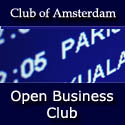Welcome
to our bi-weekly ![]() Club
of Amsterdam Journal.
Club
of Amsterdam Journal.
Join our discussion about ![]() the
future of the Global Workplace on March 29:
the
future of the Global Workplace on March 29:
Organisations are 'going global' in new ways and expanding to new locations,
offering considerable benefits for the organisation. These bring a new
set of employment opportunities and problems. The traditional arguments
for offshoring to new locations have often been built around cost arbitrage,
taking advantage of lower labour and related costs in manufacturing
or routine service provision. Recent studies show that the 'new' locations
can offer access to skilled and innovative pools of talent, and to different
approaches to leadership and management. The motivation of mobile workers
is also changing as employees place different value on working internationally.
The discussion examines these changing workforce challenges and how
organisations are revising policies to meet these new needs. - Andrew
Kruseman Aretz, Partner, Human Resource Services, PricewaterhouseCoopers
Belastingadviseurs N.V.
Don't miss the Early Bird registration for the ![]() LAB
on Old and New ENERGY
- March 9th!
LAB
on Old and New ENERGY
- March 9th!
And for ![]() LAB
on MEDIA and Human Experience
- March 16th!
LAB
on MEDIA and Human Experience
- March 16th!
Felix
Bopp, editor-in-chief
| .Knowledge Process Offshoring | ||
|
|
||
| .Energy LAB | ||
|
||
| .News about the future of the Global Workplace | ||
 |
By Stephen M. Paskoff, Esq., President, ELI Many multinational firms are struggling with a kind of identity crisis: How do we create one global workplace community out of all of these various and culturally distinct workplaces? Moreover, what do we expect of the members of that global community in terms of how they treat one another and conduct their business? When an employee in one region can send an inappropriate or culturally offensive e-mail to people around the world with one click, finding an answer to these questions is becoming more and more of a business necessity. Corporate culture and “people” issues take on new complexities when the workplace spans multiple countries and regions. |
|
 |
The general trend throughout industrialized nations is a sharing and cooperation of research and legislation. The US, EU, UK, Australia, Japan, Korea, Finland and Canada, all recognized leaders in occupational health and safety, are using information technology to share this information across borders. This is seen in the buildup of content-rich national websites conveniently linked for ease of use by employers throughout the world. The EU has a research agenda, which puts it in the lead for research-based information on Occupational safety and health. |
|
| .Club of Amsterdam blog | ||
 |
March
05: |
|
| .News about the Future | ||
 |
|
|
 |
Sub-Saharan Africa must improve its scientific and technological capacity if it is to boost social and economic development. According to UNESCO, there is less than one scientist or engineer for every ten thousand people in Africa - compared with two to five per thousand in Europe and the United States. But experts disagree on how to improve this capacity. Some suggest investing in select institutes as centres of excellence; others argue that efforts should focus on strengthening existing infrastructure. Some think policymakers should support capabilities within individual firms, while many believe that informal research and development activities, or cross-sector networks, best encourage industrialisation. |
|
| .The Future of China’s Economy – The Path to 2020 | ||

|
|
|
The Report Against this backdrop of breathtaking statistics, how is the rest of the world reacting, how are businesses viewing the China market and what are their expectations of China's global impact in the period to 2020? To help address these
questions, Rohit Talwar has undertaken a major global business survey
on the future of China's Economy in which over 700 respondents from
60 countries across five continents provided detailed responses.
This represents the first global study of its kind on such a scale
- providing rich quantitative and qualitative insights into how
attitudes and ambitions for the China market are evolving across
continents. The report highlights how concerns and expectations differ between those operating in China and those looking in from outside. It takes a long term-perspective the proportion of firms' staff, revenues and profits that will be accounted for by the China market and explores the potential for others to follow the lead of IBM's procurement business in relocating their headquarters to China. The report also provides clear comparisons on how attitudes and expectations differ across business sectors and professions. Finally, the report highlights a number of critical questions for firms' currently planning or evaluating their China strategies. |
||
|
||
| .Next Season Event | ||

|
Thursday, March 29, 2007 Registration: 18:30-19:00, Conference: 19:00-21:15 Where: PricewaterhouseCoopers, Thomas R. Malthusstraat 5, 1066 JR Amsterdam With Mandar Apte, Business Strategy - Competitive Intelligence Analyst, Shell Global Solutions International B.V. Workplace of the future - scenarios and trends - Views of a global citizen Andrew Kruseman Aretz, Partner, Human Resource Services, PricewaterhouseCoopers Belastingadviseurs N.V. Changing demographics of people flows around the World Jean-Claude Knebeler, Director of Foreign Trade, Ministry of the Economy and Foreign Trade, Luxembourg Does off-shoring hold the key to success, especially for SME's? Moderated by Hedda Pahlson-Moller, Managing Director, Omnisource International, Benelux Client Executive for Evalueserve 



Supporters 
|
|
| .Recommended Book | ||
 |
by Roger Blanpain, Susan Bisom-Rapp, William R. Corbett, Hilary K. Josephs, Michael J. Zimmer With the forces of globalization as a backdrop, this pathbreaking casebook develops labor and employment law in the context of the national laws of nine countries important to the global economy -- U.S., Canada, Mexico, U.K., Germany, France, China, Japan and India. National materials are contextualized by coverage of international labor standards promulgated by the International Labor Organization, as well as the principles that emerge from two regional trade arrangements -- the North American Free Trade Agreement and the European Union -- and TNC's self-regulatory efforts. Instructor resources include an extensive teachers' manual, powerpoint slides, and a website providing updates in this broad and fast-moving subject. |
|
| .Q&A with Nathalie Horbach about the future of Nuclear Energy | ||
 |
Nathalie Horbach, Centre for Energy, Petroleum and Mineral Law and Policy, University of Dundee |
|
|
It is for that reason that it can be considered to be increasingly 'sustainable'. However, there remains the issue of waste, which includes also an intergenerational aspect, that could be both negative (imposing a potential 'radioactive' inheritance) and positive (potentiality of an essential future energy source in view of new technological reprocessing developments), even though not imposing society with unconfined and uncontrollable emissions. In addition, proliferation and terrorism risks continues to be a source of concern, resulting in political reservations with respect to nuclear energy. Nonetheless, nuclear energy seems in the mid- to long term to be a 'sensible choice' in view of all available options. It is a credible and necessary alternative, especially in combination with renewable sources of energy, to reduce carbon fuel dependency both to respond to climate change and environmental concerns as well as insecurities inherent (and recently increasing) in the global energy supply market. As such, the policy
to no longer exclude nuclear energy as an option and even to increase
reliance on nuclear power, could play an important mid-term role.
On the one hand, it attracts further investment into developing
safer and environmental neutral forms of generating nuclear electricity.
Such is currently the focus of joint efforts in respect of nuclear
fusion and 'new generation' nuclear facilities, which are constructed
to be inherently safe, highly economical, proliferation resistant
and produce minimal waste. On the other hand, it ensures an adequate
electricity supply in the middle long-term, while reducing usage
of carbon fuel as part of a global policy, and thus allows in the
meantime increasing efforts and investments in further maturing
other energy sources (wind, solar, etc.) in order to shift to a
potential better sustainable option in the long-term.
|
||
| .Media LAB | ||
|
||
| .Q&A with Simon Taylor about Climate and Energy Provision | ||
 |
Simon Taylor, Director and Co-Founder, |
|
Club of Amsterdam: Simon, you are a Director and Co-Founder of Global Witness, an organisation that exposes the corrupt exploitation of natural resources - amongst them oil and gas. What are your long-term strategies and how do plan to implement them? In 1993 together with two others, Charmian Gooch and Patrick Alley, I set up Global Witness to expose the corrupt exploitation of natural resources and international trade systems, to drive campaigns that end impunity, resource-linked conflict, and human rights and environmental abuses. Half of Global Witness’ work involves the compilation of first hand evidence and information about the situation on the ground in areas of conflict and instability through conducting investigations, field visits, and standard research. Such information is then compiled into hard-hitting reports which are subsequently taken to all key policy makers to ensure change. Half of our work is accurate information gathering – the other half strategically using such information to drive positive change. Right now, the existing modalities for natural resource extraction do not work. Details of such arrangements are usually shrouded in secrecy, and the provision of concessions almost always, certainly in the developing world, involves major corruption. Usually also in our experience, it is very hard to see the benefits being accrued to the country and its population – rather, the population is usually on the receiving end of a litany of abuse, a degradation of quality of life, and very often conflict. Such conditions tend to prevail for the masses, whilst a small elite benefit on a vast scale through the wholesale asset-stripping of state assets and the passing of the proceeds through the international banking system, with no questions asked. So, in summary, the existing international architecture which governs the roles of companies taking advantage of such conditions requires a major overhaul. Right now, shareholders, influential mafia-style middlemen, international banks, and elites within natural resource-exporting countries benefit on a massive scale, at the direct expense of their populations. You could even say that the populations of these countries subsidise these “profits” with their livelihoods, and very often with their lives. Global Witness has been exposing key examples of such business practices and the systems by which business activities operate for over a decade. We have been the key initiator of a number of international processes, including the Kimberley Process to combat conflict or blood diamonds, the Extractive Industry Transparency Initiative (EITI), which came about as a UK Government response to the launching of the Publish What You Pay Campaign (PWYP), and the FLEG initiatives to address illegal logging. These processes are far from complete. In addition, we urgently require additional changes to this international trade and business architecture, otherwise companies and individuals will continue conduct business in areas of conflict and instability, without any accountability over the impact of their actions on local populations. Global Witness will continue to expose examples of bad business in any and all sectors which influence instability and conflict and which destroy serious efforts at development in such countries. Coming out of this work will be further deliverable strategies to address these issues.
Publish What You Pay (PWYP) was launched to demand mandatory revenue disclosure from companies in the oil and gas, and mining sectors. Other sectors may be included later. This was because many such companies had been, and continue to be, involved in sleazy deals with producer country elites. These company activities have included the running of slush funds in tax havens for the purpose of bribery or delivery of “favours”, outright bribery, the payments of vast sums into personal accounts and even the payment for and delivery of weapons into conflict zones via company subsidiaries that do not officially exist. We have even come across a system where a major prominent international oil company deliberately rigged the debt of a producer country, such that it completely controlled the entire economy of the country – of course, to its favour. Of course, the other half of this coin is the role of elites in resource exporting countries who, as described above benefit from such activities. Before launching PWYP in 2002, Global Witness had already been involved in a 2 ½ year discussion with some of the more enlightened oil and gas companies to create the conditions for these companies to disclosure their payment data on a voluntary basis. In early 2001, BP announced that it intended to disclose such data in Angola – only to be faced with contract termination and being thrown out of the country. The circumstances around this incident ultimately demonstrated the limits to which oil companies, even if they wanted to, could go. Ultimately, going it alone would be disastrous for any company – not only this, but those companies which were fundamentally part of the problem had no intention of following such an example, and would be left to pick up contracts at the expense of the “good” companies. Such a voluntary process was thus completely inoperable! The launch of PWYP quite rapidly created a reaction from the UK Government, which launched the Extractive Industry Transparency Initiative (EITI), which brings together producer and consumer governments, a large percentage of the global key oil, gas and mining companies (there is a need to attract more of them), and civil society. The initiative is based on the premise that countries would volunteer to disclose the revenue streams they obtain from the extraction and export of oil and gas and mining products. Once a country steps up to the mark, all companies would be then be obliged to disclose the payments they make for the extraction of the resources in their concessions. This way, comparison can be made between what companies say they pay, and what countries say they receive. Any discrepancy could then be independently assessed, with civil society being intimately involved in the process. The result would be a level of disclosure of the vast rents which accrue as a consequence of natural resource extraction (in particular, oil and gas) which hitherto has not been available. This would create an absolute minimum, but vitally important, first step towards creating accountable governance over such revenues in order that they might actually benefit the citizens of the countries concerned. There are various areas of concern with these arrangements thus far. The most important of these is that it remains very hard to imagine the likes of President dos Santos of Angola, or President Obiang of Equatorial Guinea (there are many others who could be added to this list) actually volunteering their countries to implement EITI. The elites who call the shots in both these countries are amongst the pre-eminent kleptocrats in the world today, and they have no interest in being held accountable for the expenditure of their State’s revenues, which are currently making them very rich. Having said that, there is some delivery coming from EITI due to the significant implementation of EITI by Nigeria and Azerbaijan – both places where it would have been hard to believe this was possible only a short while ago. These are significant steps forward, but it is important to understand that this is a work in progress and we need to see where the initiative goes over the next year to year and half, whilst also continuing with efforts to deliver mandatory disclosure mechanisms in a variety of jurisdictions. PWYP is now a coalition of 300+ civil society organizations across all continents of the world. It is an extremely effective and efficient coalition and is represented on the International Advisory board of EITI, such that civil society plays a key role in the evolution and delivery of EITI. The PWYP coalition is intimately involved in a global push to deliver parallel mandatory solutions to revenue transparency, premised on the idea that we need to see accountability over the management of resource revenues by both the elites who control the expenditure, and the companies who do the paying. The consequence of this global engagement is that the idea of revenue transparency in all countries for natural resource extraction has moved from an issue where we were initially laughed at by company and government officials as being unrealistic, to a situation today where it is in the mainstream, and where the key largest oil, gas and mining companies, together with an array of producer and consumer countries have agreed to the delivery of revenue transparency. We now need to keep up the pressure and see where this process goes.
We are rapidly heading to a global crunch-time regarding the provision and utilisation of energy. This “crunch” primarily relates to two major global crises, which if not addressed are likely to precipitate a vast array of additional crises, seriously threatening any future prosperity, let alone the prospect of significant development across the world’s least developed countries. I am referring here to the nexus of the climate and energy provision crises – each in their own right seemingly vast imponderable problems, but which when taken together create a problem the scale of which humanity has not yet experienced. We are familiar with many of the serious implications of impending climate change, and so I will not go into any detail here. However, thus far the political response to this situation is massively inadequate to the task. We see political posturing, and at best now at least the clarion call for action on the basis that this is a serious matter for humanity to address. But then, almost in the same breath, the “solutions” put forward are so inadequate that one might be tempted to laugh, if the implications were not so serious. Simultaneously, and neatly compartmentalised into another section of governments’ thinking, we also hear the call for energy security. Whilst it is of course obvious from any state’s perspective, to secure stable supplies of essential energy, it is clear that for the main part such calls relate to securing ever more supplies of oil and gas – the very things we should be avoiding if we wish to slow down and ultimately prevent dangerous climate change. The consequence of this shallow thinking is that the entire global energy provision system of financial, diplomatic and corporate operations remains geared to business as usual. As if this was not bad enough from a climate change point of view, we are rapidly heading towards (if we have not got there already!) a peak in global conventional oil production. Gas is not too far behind. The consequence of global conventional oil peaking is not that we run out of oil – oil will still be available for a long time to come. What it does mean once this peak in output is reached is that global oil production will no longer be able to match demand. Furthermore, the lines on any graph of production versus demand are likely to separate very quickly. All this leads ultimately, and within very few years, into very dangerous territory: At best it will completely undermine the global governance agenda, leading to the end of such initiatives as EITI, with companies and governments rushing to the bottom to outbid one another in a downward spiral of dirty deals. At worst, within very few years after a peak of oil output, we face the prospect of global powers – nuclear armed powers - facing off against each other in an increasingly aggressive posture for essential energy resources. Following on from the climate crisis disaster, political thinking around the provision of energy represents a second massive abrogation of responsibility by our political leadership. Given the pre-eminent role oil plays right across the global economy, it is not just the prospect of military confrontation we should be worried about. Indeed the economic implications could be a disaster on the scale of 1929 all over again. There are of course no easy solutions to this situation. However, what is clearly required is the kind of global leadership and international cooperation on the scale we have seldom seen in the past. The output needs to be nothing short of a global revolution around the way in which we generate and utilize energy and its subsequent equitable availability. Nothing less will suffice. Whilst this might sound dismissive, nuclear power would seem to be an unnecessary distraction which does nothing to address either our overall energy requirements, or the overall use of carbon intensive energy sources – and that is before we consider the implications of the complete lack of adequate waste management, the propensity for increased nuclear use to create its own security of supply problem, the appalling overall record of the industry when it comes to onsite safety and maintenance, and the increased risks of nuclear proliferation and the potential for terrorism. In terms of the dialogue,
I would hope we can discuss some of these issues further during
the Thank you Simon! |
||
| .Agenda | ||
|
||
|
||
|
||
| .Club of Amsterdam Open Business Club | ||

|
Are you interested in networking, sharing visions, ideas about your future, the future of your industry, society, discussing issues, which are relevant for yourself as well as for the 'global' community? The future starts now - join our online platform ...: http://www.openbc.com/go/invuid/Felix_Bopp2 CIWI - Creative Minds Worldwide |
|
| .Contact | ||
|
||
| .Subscribe & Unsubscribe | ||
|
||
| m | ||
Copyright © 2002-2007, Club of Amsterdam. All rights reserved.








 ...
... ...
...






